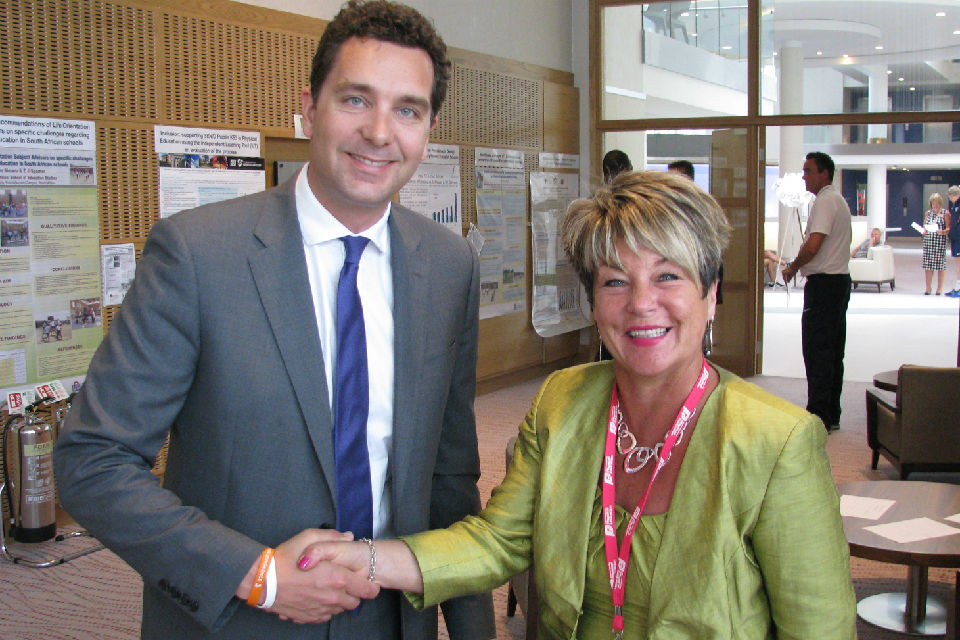Edward Timpson addresses the Association for Physical Education (AfPE) national conference
Edward Timpson, Children’s Minister, speaks about support being provided across government for school sport.

Thanks, Jeanne (Dr Keay, Chair of AfPE), it’s a great pleasure to be joining you today in these truly impressive surroundings - and with just a fortnight to go before we celebrate the Olympics’ anniversary, in a week that’s so far seen phenomenal British sporting success, the reigniting of last year’s Olympic spirit is well underway.
As someone who devours sport whenever I can, and who spent much of my childhood hitting a tennis ball against the garage door or standing in goal, pretending to be my sporting hero Big Joe Corrigan, the Manchester City and occasional England keeper, from the 70s and 80s, whilst my nearly as big brother pounded penalty after penalty at me with little mercy shown, I’m all too aware of the real benefits that instilling sport and PE in a child’s life as early as possible can bring - physical, social and emotional.
Looking around, it’s fantastic to see that these superb state of the art facilities are not only open to our national side for training, but also to local schools and community teams. So, young people can play on the same pitches as their footballing idols, with the hope, of, one day, following in their footsteps, or rather studmarks.

Edward Timpson with Sue Wilkinson, Chief Executive of AfPE
But as inspiring a prospect as this is, for many of these children - as with children everywhere - it’s not the heroes on their screens or in distant stadiums who will, ultimately, help them develop a lifelong love of playing sport themselves. It’s talented, committed PE teachers like you.
By encouraging children to become active at an early age, you are, in every sense, setting them up for life - to stay fit and healthy, to build character and to experience the thrill of exceeding their own expectations, again and again. Qualities that are not only real attributes on the pitch or the playground, but in every kind of arena that life throws at us.
Which is why we’re so keen, across government, to support you to seriously raise our game when it comes to school sports.
It’s why we’ve been working closely with AfPE, Sport England, the Youth Sports Trust as well as national sports governing bodies - many of whom are with us today - to see how we can do more to support your work as PE teachers.
And I would like to take this opportunity to say a special thanks to Sue Wilkinson and Dr Jeanne Keay from AfPE. Their contribution to the PE expert group, which has been looking at improving specialist initial teacher training and continuous professional development (CPD), has been invaluable.
In all of this, there’s absolutely no question that school sport is right up there as a priority for those of us in government - whether that be in the departments for education, health or sport.
It’s why, the Secretary of State made clear, right from start of the current national curriculum review and confirmed on Monday that PE will remain compulsory at all 4 stages.
And why, in March, the Prime Minister announced a significant boost in funding for PE and sport in our primary schools.
We made this decision after consulting widely with schools, teachers and sporting organisations. And from this, there emerged a strong consensus that the area which needed the most support was primary school PE.
This joint injection of £150 million a year by the departments of education, health and sport is a huge investment at a time when money is incredibly tight. In Staffordshire alone, where we are now, this amounts to over £2.6 million a year in extra funding. This will doubtless provide a welcome boost to youth sports provision in an area which, I understand, includes a number of excellent Change4Life clubs.
It’s money that’s ring-fenced - the only school funding that has such protection - and goes directly to headteachers who, we believe, know best how to meet their pupils’ needs.
And, in fact, I wrote personally to heads, just a fortnight ago, with my ministerial colleagues Hugh Robertson, representing sports, and Anna Soubry, from health, on this very subject, outlining the support that’s available to help them make the most of their extra money.
Having spent time listening to teachers, heads, parents and pupils, there’s 1 area, in particular, that I’m keen they focus on is the lack of specialism at primary level.
As a consequence, we’re doing a huge amount of work with the National College for Teaching and Leadership to tackle this head on by improving initial teacher training and better supporting continuous professional development.
And we’re funding 3 pilot summer schools to train 120 primary PE specialists, which are about to get underway in just a few weeks’ time.
It’s encouraging to know that AfPE is also making great strides in this area, with 1,000 specialist teachers so far set to be trained through its bespoke course by the end of the next academic year. Giving them a recognised professional qualification that will go a long way towards promoting more high quality provision, that will endure.
But, above all, these additional funds present heads with an especially good opportunity to address the lack of PE specialists - something that’s vital to bringing about a culture change and really embedding sporting expertise in schools.
Precisely how heads spend the money will vary according to the particular circumstances of each school. But they need to make these decisions based on evidence of what works, if the funding is to go further and bring about the sustainable change we all want to see.
Naturally, some schools will be more aware of the available options than others. The best guide is, of course, good practice in other schools.
And we know that there’s plenty of outstanding work going on in primary and secondary schools - something that AfPE rightly celebrates through its annual awards, which I had the pleasure of presenting back in February.
I’ve been tipped off that 1 of the winners, Swavesey Village College, from the Cambridge area, is with us today. Congratulations to them again. As just 1 of 5 schools to achieve an AfPE Quality Mark with Distinction, their incredibly high level of sports provision is a terrific example to others.
As are the 4 primary schools, on the fringes of my own constituency in Cheshire, who’ve decided to pool the extra money they’re getting to buy in a full-time specialist coach. The coach will spend 1 day a week in each of the schools and then spend the fifth day working with pupils who need extra help.
And just last month, I also saw, first hand, the brilliant work that the Marjorie McClure Specialist School in Chislehurst is doing to help children with disabilities enjoy sport. The pupils’ level of engagement was extraordinary - a glowing testament to the skill and dedication of their PE teachers. I even had the opportunity, there, of beating John Steele, of the Youth Sport Trust, in a wheelchair race - something that I haven’t been able to resist mentioning whenever he’s around! Knowing John, I suspect he’s already planning a return fixture!
And, tomorrow, I’m visiting a school in Clapham, in south London, with Lord Coe and Hugh Robertson, the Minister for Sport, to see some of the more imaginative approaches up close.
But we don’t want to simply highlight what good looks like on visits.
We want to make it easier for teachers to tap into this wealth of experience and expertise. Which is why we’ve provided lots of information about the delivery of great schools sports provision on our website.
Including advice from professional sporting bodies and analysis and evidence of good practice, both from here and abroad, with case studies showcasing the innovative things that schools are doing, both inside and outside school and inside and outside normal school hours.
So, heads can see what schools like Allenbourne Middle School, in Dorset, are doing to create excellent, embedded provision.
So they can learn from the experience of those like Bishop Stanton and Sutton Drew, 2 rural primaries in Bristol, that are pooling the extra funding to share a specialist PE teacher.
And so they can be inspired by schools such as Felsted, in Essex, where PE lessons are monitored for quality and where staff receive regular PE training. Pupils, there, are also encouraged to take part in activities they may not have tried during the school’s sports week.
Having said that, this online resource is not static and continues to be a work in progress that we will continue to add material to. So, if you’re doing something that has worked well, shout about it, let us know.
That way, you can help other schools make decisions about how best to spend the additional money, and potentially make a difference to even more children’s lives.
Now, as I said before, we’re keen to make sure that these spending decisions bring real benefits to children and young people. So it’s right that we monitor the impact that they’re having.
As a result, from September 2013, Ofsted inspectors will be asked to look at how well schools are using the money to improve the quality and the range of PE and sports provision and whether more children are taking part and achieving well. Ofsted will also carry out a survey, in a year’s time, to see where the funding has had the biggest impact and where we need to go further.
It’s also important that schools are accountable to parents. That’s why we’ll be requiring schools to include details about their sports provision on their website, alongside information about their curriculum.
But, as we approach the anniversary of the London games, I think we’d all agree that the best measure of the success of this funding is how far it goes to keeping the Olympics’ flame alive in the younger generation.
The spirit of the London games was simply unforgettable and continues to be felt to this day - putting a smile on our faces, a glow in our hearts and a spring in our step. And by the bluntest estimate, in the billions they generated for the economy and in the 8 spectacular Olympic venues whose future uses have already been secured - in stark contrast to Athens and Barcelona that came before.
But it was the promise of a lasting legacy, in the shape of children being inspired to get active at an early age and carry that with them into adulthood, that ultimately clinched the capital’s bid.
It’s a legacy in which we all have stake - and none more so than you, as PE teachers.
I’m eager that we should do all we can to support to you in this hugely worthwhile endeavour, so that, together, we can honour this legacy and see many more of the children you teach enjoying and developing a lifelong love of sport and exercise - and maybe even, one day, claiming their own places on the Olympic and Paralympic podiums.
Unlike Andy Murray or Jessica Ennis, Big Joe Corrigan never got to inspire a whole generation, or single-handedly lift the spirits of a nation, but at the very least he did instil in me a passion for sport that continues to burn inside me to this day. If Big Joe can do it, you can do it too!
Thank you.